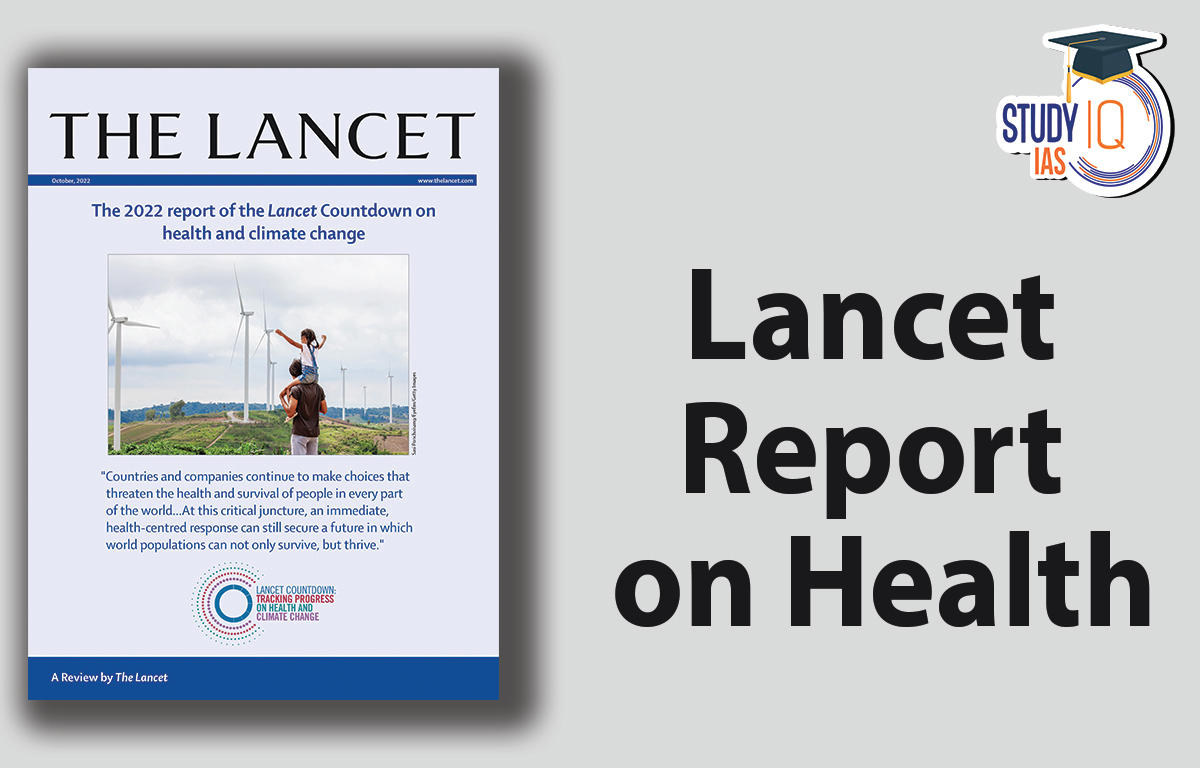Table of Contents
Lancet Report Snippets
- It has traced in detail the intimate link between changing weather events and their impact on the health of people.
- Climate change is a global phenomenon, impacting every aspect of life, sweeping in its train nations across the world, irrespective of whether they contributed to it or not.
- World’s reliance on fossil fuels increases the risk of disease, food insecurity and other illnesses related to heat.
- Climate change worsening impacts are increasingly affecting the foundations of human health and wellbeing, exacerbating the vulnerability of the world’s populations to concurrent health threats.
Lancet Report on Climate Change and Health
1. Climate Change and Health:
- Rapidly increasing temperatures exposed people, especially vulnerable populations (adults above 65 years old and children younger than one) to 3.7 billion more heatwave days in 2021 than annually in 1986–2005.
- According to the World Health Organization (WHO), climate change affects the social and environmental determinants of health — clean air, safe drinking water, sufficient food and secure shelter.
- Rise in Infectious Diseases:
- Climate change is affecting the spread of infectious disease, raising the risk of emerging diseases and co-epidemics.
- The WHO has predicted that between 2030 and 2050, climate change is expected to cause approximately 2,50,000 additional deaths per year, from malnutrition, malaria, diarrhea and heat stress.
- Example: Coastal waters are becoming more suited for the transmission of Vibrio pathogens.
- Number of months suitable for malaria transmission has increased in the highland areas of the Americas and Africa.
- Climate Change and Mental Health:
- Acute temperature increase, heatwaves, and humidity have been associated with worsened mental health outcomes and increased suicidality.
- Hazards such as droughts can disrupt agricultural production, affect livelihoods, and cause food and water scarcity and other hardships that affect family relationships, increase stress, and negatively impact mental health, with differences between genders.
- Climate change can exacerbate conflict and violence (including gender-based violence),
- It can influence people’s decision to migrate, which can in turn affect mental health and wellbeing.

2. Climate Change and Food Security:
- Higher temperatures threaten crop yields directly, with the growth season shortening for many cereal crops.
- Extreme weather events disrupt supply chains, thereby undermining food availability, access, stability, and utilisation.
- The prevalence of undernourishment increased during the COVID-19 pandemic, and up to 161 million more people faced hunger in 2020 than in 2019.
- Russia’s invasion of Ukraine has only worsened the situation, as both Russia and Ukraine provide 90 per cent of the wheat supply in Armenia, Azerbaijan, Eritrea, Georgia, Mongolia and Somalia.
- Ukraine is also a major source of wheat for the World Food Programme, which provides food assistance to 115.5 million people in more than 120 countries.
3. Increasing Dependency on Fossil Fuel:
- Russia’s invasion of Ukraine has led many countries to search for alternative fuels.
- Move to Thermal Energy: Renewed clamour for coal based energy, could hampers air quality improvement and push the world towards a future of accelerated climate change that would threaten human survival.
Lancet Report Meaning: Way Forward
- Health-Centric Response: It would reduce the likelihood of the most catastrophic climate change impacts, while improving energy security and creating an opportunity for economic recovery.
- Improvements in air quality will help prevent deaths resulting from exposure to fossil fuel-derived ambient PM2.5.
- Focus on low-carbon travel and increase in urban spaces would result in promoting physical activity which would have an impact on physical and mental health.
- Urban redesign that puts health first can provide increased greenspace that reduces urban heat, improve air quality, and benefit physical and mental health.
- Accelerated transition to balanced and more plant-based diets: It would have the multiple benefits of:
- Reducing agricultural greenhouse gas emissions
- Improving health outcomes
- Reducing the diversion of grains to livestock and the demand of land for crop production, water demand, and the risk of agriculture-related zoonotic disease outbreaks.
- It would reduce the burden of communicable and non-communicable diseases, reducing the strain on health-care providers, and leading to more robust health systems.
- Food insecurity requires coordinated and robust action across multiple sectors of governments and societies.





















 WhatsApp
WhatsApp